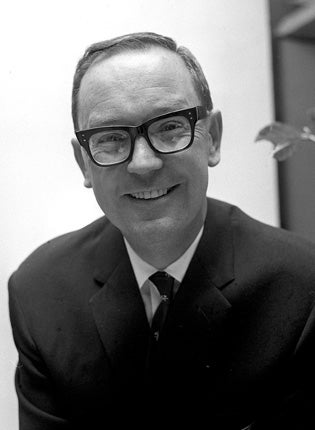Harry Carpenter: Sports commentator known as 'The Voice of Boxing'

Harry Carpenter was a gentleman with a microphone and often looked a little lost in the dirty business of boxing.
The son of a wholesale fish merchant, he was born in south London in 1925, and started to work for the BBC in 1949, becoming the boxing correspondent in 1962, and he remained in that venerable post until his retirement in 1994. He also worked for the Daily Mail between 1954 and 1962. He loved his golf, he was a regular in the presenters' chair for Sportsnight, Grandstand and Sports Personality of the Year, but he was known as the smooth voice of boxing at a time when a single voice could dominate a single sport.
Carpenter belonged to a gentle time in the world of boxing when there were far fewer major fights and being the BBC's boxing man was a distinguished career. There are numerous films of Carpenter, with his trademark thin tie, driving somewhere in America on his way to meet Sonny Liston or Muhammad Ali or another champion from the 1960s and '70s. It was a time before boxing news was old news inside an hour, a time when Carpenter's interviews and short films with American legends was the only way British boxing fans ever got to see their idols.
He was ringside the dark but spectacular night that Muhammad Ali defied the odds to shock the world, including Carpenter, and win back the world heavyweight title from George Foreman in Zaire in 1974. Ali and Carpenter had been swapping views for a long, long time and it was fitting that Carpenter was persuaded to present Ali with the Sports Personality of the Century award in 1999. Their embrace during that night of tears was genuinely heartbreaking.
It was in May 1980, at the ABA finals inside the decaying Wembley Arena, that Carpenter first commentated on Frank Bruno, the fighter who would come to be most closely associated with him. Bruno was only 18 when he won the ABA's heavyweight title that night, and he turned professional and fought for the first time in 1982. Carpenter was there from the start, and the BBC, with its exclusive promoters Jarvis Astaire, Terry Lawless and Mickey Duff, delivered fight after fight. A double act was quickly established and at some point "Big Frank", as Carpenter often called him, coined the phrases: "Where's 'Arry?" and "Know what I mean, 'Arry?"
Carpenter was at first a reluctant participant in the often inane banter, but there was no doubting the enormous affection he had for Bruno. It was during Bruno's world title fight with Mike Tyson at the Hilton in Las Vegas in 1989 that Carpenter seemed to leave his seat, abandon his professionalism and follow his heart by screaming encouragement live from ringside. It was an astonishing lapse and at the same time it secured Carpenter a special place in the minds of all boxing fans. Carpenter was doing what millions in Britain were doing during the brief and even exchanges before Tyson ruined Bruno's dream.
The relationship with Bruno continued long after Carpenter retired and long after Bruno went to Sky. It remains the main reason why Carpenter is so well known, but long before Bruno started to fight, Carpenter was grilling great boxers in gripping interviews in America. There is one particular interview with the felon and mob-connected champion Liston, compelling because of the boxer's seething malevolence and Carpenter's refusal to squirm.
Carpenter was ringside when Ali won the world heavyweight title from Liston in Miami in 1964. The BBC screened the fight and seven million were said to have watched the Louisville Lip shock the world. Carpenter was joined on air by the former heavyweight champion, Joe Louis.
One of Carpenter's strongest points was his ability, due in part to his days on a newspaper, to do his own research, and he possessed an index card collection that made me envious. Each year at the ABA finals he would produce his often grubby cards and make his precise notes for the fights that were about to start. It is often forgotten that he worked for the BBC at every Olympic Games from 1956 until 1992, and Carpenter knew that there is no better time for getting to know tomorrow's professional champions than during the slow hours of a major amateur tournament. He knew fighters like Bruno, Barry McGuigan, John Conteh, John H. Stracey and Charlie Magri long before they marched from amateur obscurity to world-title glory. Carpenter was an old-fashioned pro.
His finest moments behind the microphone were in Zaire, Ali versus Foreman, with experts fearing for Ali's life. The fight is in round eight and then Carpenter describes the stunning end: "Ali, at times now, looks as though he can barely lift his arms up. Oh, he got him with a right. He's got him. Oh, you can't believe it. And I don't think Foreman's going to get up. He's trying to beat the count. And he's out! Oh my God, he's won the title back at 32! Muhammad Ali." That was Carpenter at his best.
Steve Bunce
Harry Leonard Carpenter, journalist and sports commentator: born London 17 October 1925; married 1950 Phyllis Matthews (one son); died London 20 March 2010.
Subscribe to Independent Premium to bookmark this article
Want to bookmark your favourite articles and stories to read or reference later? Start your Independent Premium subscription today.

Join our commenting forum
Join thought-provoking conversations, follow other Independent readers and see their replies